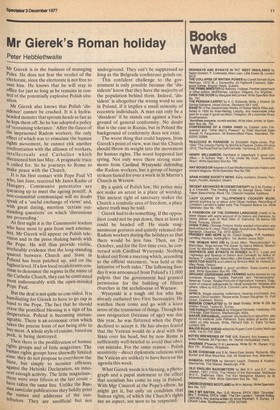Mr Gierek's Roman holiday
Peter Hebblethwaite
Mr Gierek is in the business of managing Poles. He does not fear the verdict of the electorate, since the electorate is not free to oust him. He knows that he will stay in Office for just so long as he remains in control of the potentially explosive Polish situation.
Mr Gierek also knows that Polish 'dissidence' cannot be crushed. It is a hydraheaded monster that sprouts heads as fast as he lops them off. So he has adopted a policy of 'containing tolerance.' After the fiasco of the imprisoned Radom workers, the only effect of which was to stimulate the human rights movement, he cannot risk another Confrontation with the alliance of workers, intellectuals and Catholics which threatened him last May. A pragmatic truce IS called for. So he journeys to Rome to make peace with the Church.
It is his first contact with Pope Paul VI Who, last June, received Mr Janos Kadar of Hungary. Communist potentates are queueing up to meet the ageing pontiff. A non-committal communiqué will no doubt Speak of a 'useful exchange of views' and, With great daring, mention 'certain outstanding questions' on which 'discussions are proceeding.' At first sight it is the Communist leaders who have most to gain from such encounters. Mr Gierek will appear on Polish television and in the press shaking hands with the Pope. He will thus provide visible, irrefutable evidence that the long-standing quarrel between Church and State in Poland has been patched up, and on the highest level. If a few local recalcitrants continue to denounce the regime in the name of the Catholic Church, they can be contrasted most unfavourably with the open-minded Pope Paul.
But the deal is not quite so one-sided. It is humiliating for Gierek to have to go cap in hand to the Pope. The fact that he should crave the pontifical blessing is a sign of his desperation. Poland is becoming unmanageable. There is an .economic crisis which takes the precise form of not being able to buy meat. A whole style of cuisine, based on Pork, is being destroyed. Then there is the proliferation of human Tights groups and of little magazines. The human rights groups have shrewdly limited' aims: they do not propose to overthrow the State, but simply to monitor offences against the Helsinki Declaration, an innocent enough activity. The little magazines— there were over fifteen at the last count — have talCen the same line. Unlike the Russian sarnizclat publications they boldly print the names and addresses of the contributors. They are unofficial but not underground. They can't be suppressed so long as the Belgrade conference grinds on.
This confident challenge to the government is only possible because the 'dissidents' know that they have the majority of the population behind them. Indeed, 'dissident' is altogether the wrong word to use in Poland, if it implies a small minority of eccentric individuals. A man can only be a 'dissident' if he stands out against a background of general conformity. No doubt that is the case in Russia, but in Poland the background of conformity does not exist.
The worst thing that could happen, from Gierek's point of view, was that the Church should throw its weight into the movement for human rights. The worst happened last spring. Not only were there strong statements from Cardinal Wyszynski defending .the Radom workers, but a group of hunger strikers fasted for over a week in St Martin's Church in Warsaw.
By a quirk of Polish law, the police may not make an arrest in a place of worship. This ancient right of sanctuary makes the Church a symbolic area of freedom, a place where truth may be told.
Gierek had to do something. If the opposition could not be put down, then at least it could be headed off. He Made magnanimous gestures and quietly released the Radom workers during the holidays so that there would be less fuss. Then, on 29 October, and for the first time ever, he conversed with Cardinal Wyszynski. Nothing leaked out from a meeting which, according to the official statement, 'was held at the initiative of both sides.' The following Sunday it was announced from Poland's 11,000 pulpits that the government had granted permission for the building of fifteen churches in the archdiocese of Warsaw.
Wyszynski is a tough old fox who has already outlasted two First Secretaries. He watches them come and go with a keen sense of the transience of things. Though 1116 own resignation (because of age) was due this year, he was flattered when the Pope declined to accept it. He has always feared that the Vatican would do a deal with the State over his head, but by now Rome is sufficiently well-briefed to avoid that obvious mistake. For the same reason — Polish sensitiVity — direct diplomatic relations with • the Vatican are unlikely to have been on the agenda this week.
What Gierek needs is a blessing, a photograph and a papal statement to the effect that socialism has come to stay in Poland. With Mgr Casaroli at the Pope's elbow, he might get it, but only on condition that human rights, of which the Church's rights are an aspect, are seen to be respected.










































 Previous page
Previous page